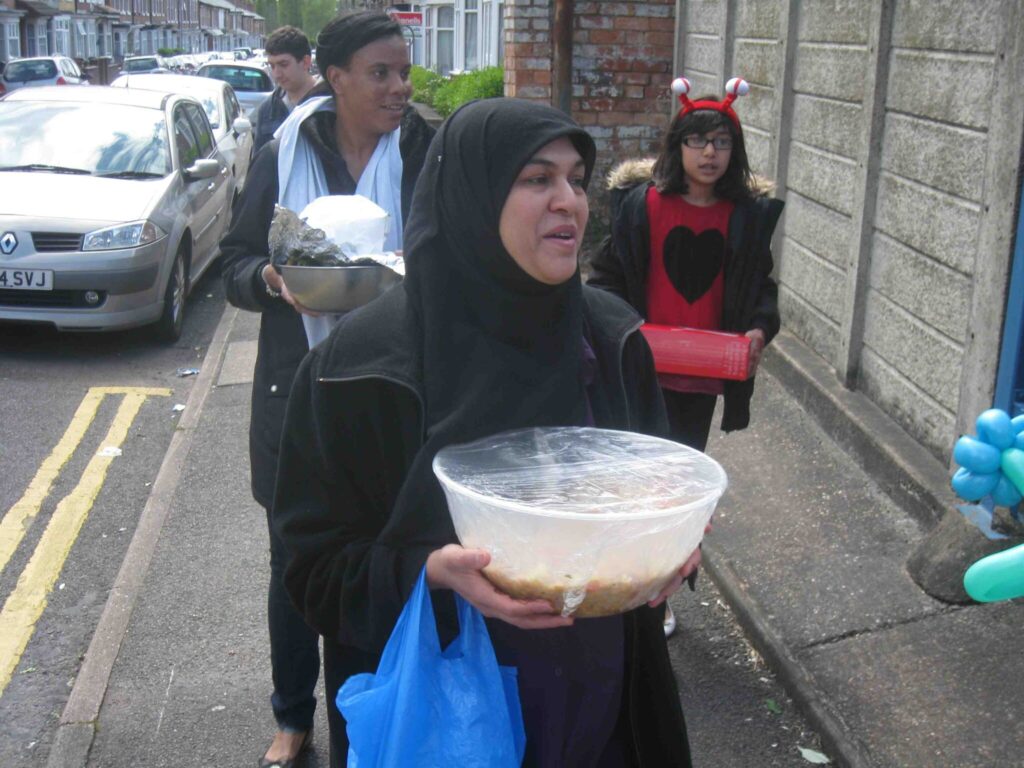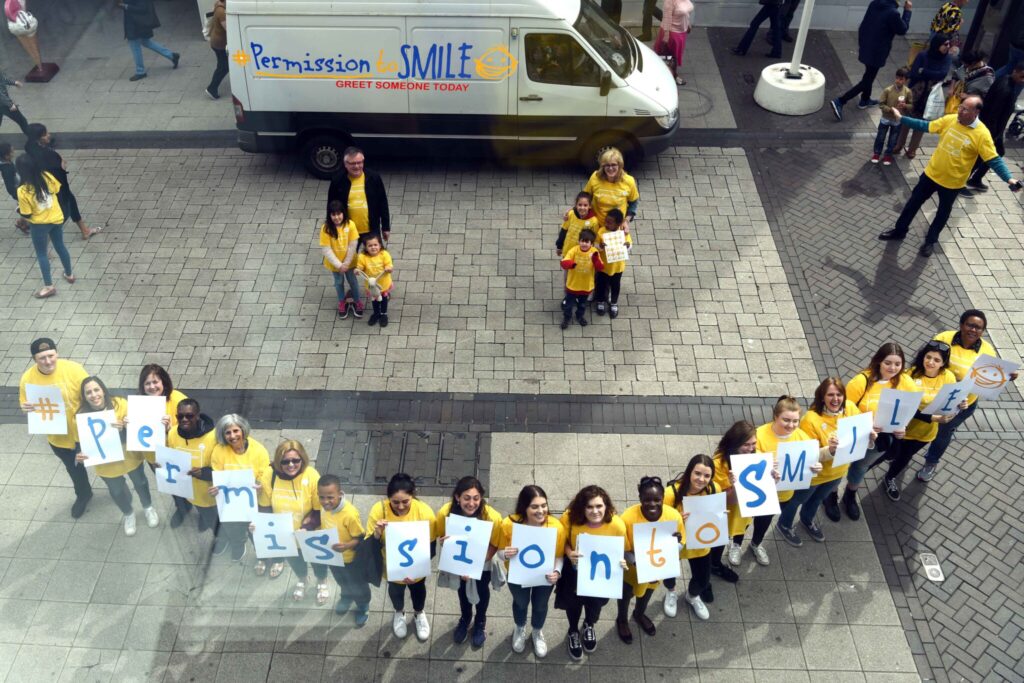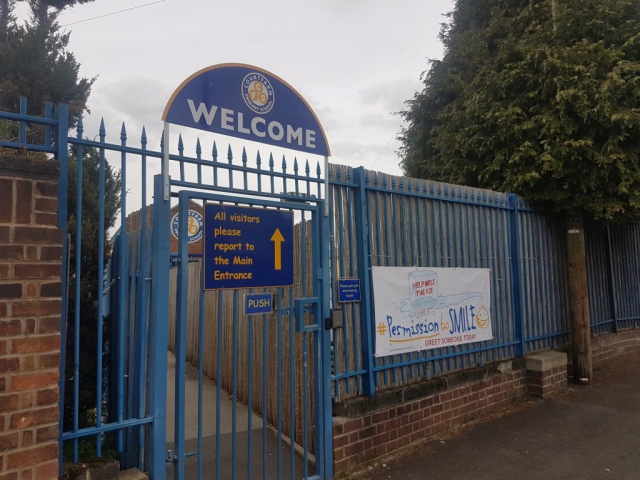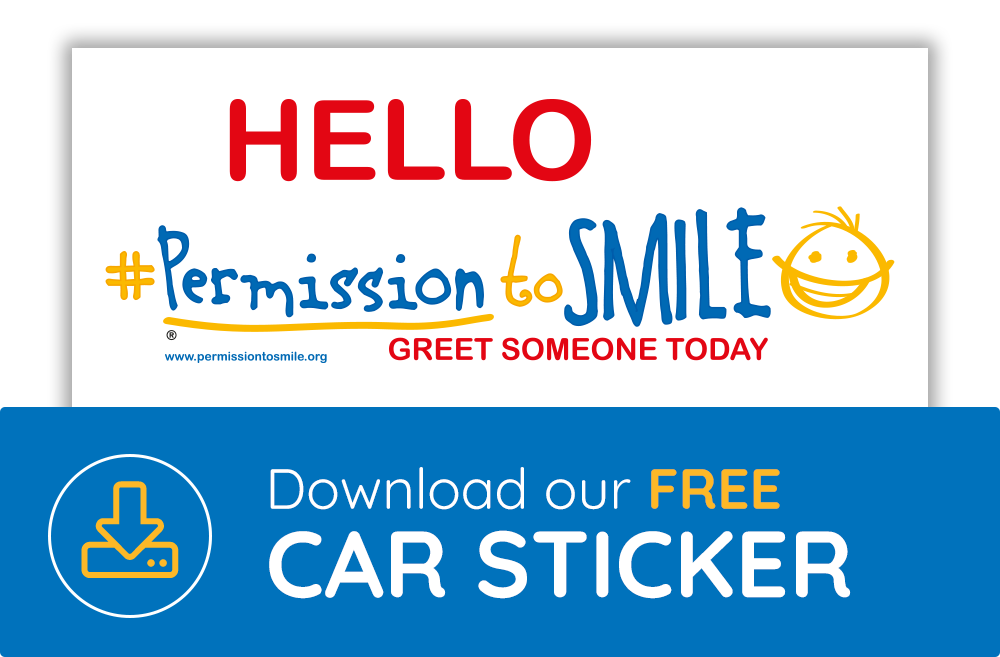All key elements of the ‘Permission to Smile’ and ‘As One’ campaigns have been tried and tested and independently evaluated – especially in respect of Street Associations, the impact of banner campaigns and of local catalysts putting on ‘tea party’ events to stimulate local activity, as set out here.

Street Associations
The first Street Association was launched in 2011. Since then, they have been started by residents wanting to build community on their own street, and also commissioned by six local authorities, often to bring positive community engagement to deprived streets.
An independent evaluation found:
Within a relatively short space of time, Street Associations has achieved its goal of using social activities to ‘rebuild’ as sense … of neighbourly social networks … Views across all streets were that Street Associations made a positive impact – both in terms of what members had personally gained from participation and through changes across the wider community … It is important to record the sheer volume of local resident support in terms of volunteer time [and] donations of goods … Feedback from participants … was unanimously favourable in their response to Street Associations
Angus McCabe of Birmingham University’s Third Sector Research Centre. The full report is available here
“In working closely for some two years with Uturn UK, founders of Street Associations, I have become familiar with the impressive achievement of SAs in achieving their aim of creating resident-led frameworks aimed at bringing people together, to overcome barriers and rekindle community spirit in streets where supportive community is most lacking”.
Professor David Morris, director of the Centre for Citizenship and Community. A study of relational networks in Kingstanding, Birmingham, jointly conducted by the Centre and Street Associations, is available here
In 282 follow up surveys of Street Association members:
- 51% said they had been helped personally to feel less lonely or isolated
- 87% said their street has a community spirit, compared to 41% in the baseline survey
- 93% said the SA had brought different ethnic groups together
- 96% said the street had become friendlier, and
- 98% said the SA had brought different generations together.
Additionally, Solihull Council research found that seven Solihull Street Associations saw a 38% reduction in police call-outs compared to the previous year, compared to a 30% increase on four comparable, but not neighbouring, streets. More information can be found here
Comments recorded from Street Association members include the following:
It is wonderful to drive into our street and wave at, and be welcomed by, several different households on the way in. Friendship groups and offers of help have blossomed, allowing people to check on the elderly and vulnerable whom they have developed bonds with through the various daytime and evening events that have bridged the generation gap. It has improved our quality of life hugely, and given the community some heart. It has been a fantastic addition to our lives
Dr James Brunning, of Harborne, Birmingham
I am an elderly lady living on my own. As soon as I heard of the Street Associations being set up, I said ‘Yes!’ to myself. I was lonely and the Street Association helped me take my first steps toward speaking to other people on the road. The Street Association has had a transforming effect on my life. I feel that something lifted in the street and that real change has happened
Janet Graham of Selly Oak, Birmingham
A research study, led by Professor Michael Butler of Aston University Business School, is currently looking into the role and impact of Street Associations during the Covid-19 Lock-down and results will be published here as soon as they are available.
Permission to Smile
I have been greatly impressed with the imagination, hard work and determination of the Permission to Smile campaign team in gathering a huge partnership and in gaining a high profile across the city for this important message. The campaign has been an amazing success.
Cllr Ian Ward, Leader, Birmingham City Council

An independent evaluation of Birmingham’s Permission to Smile campaign by Birmingham City University’s Centre for Social Care, Health and Related Research was recently published. The study recruited 177 participants from organizations where banners were displayed, approximately equally from parents at local primary schools, from BCU students and from local churches. 55% reported a noted increase in the friendliness of others within their community. 81% of the sample had seen Permission to Smile banners; 86% said that seeing the banner had encouraged or would encourage friendlier behaviour and 89% agreed that “it would be better if people smiled and greeted each other in our community”; and 94% said that a campaign which encourages friendliness with those around us is ‘necessary’. Additonally, 83% expressed a sense of personal responsibility to create a friendlier and more connected local community.
The evaluation authors concluded, “The results of this study suggest there is common enthusiasm across varied communities for interventions such as the Permission to Smile campaign, with the vast majority of participants reporting such interventions as necessary. When paired with the sense of responsibility to contribute to this agenda that is highlighted in the findings, it appears that the use of a banner may be particularly effective in raising awareness and potentially influencing an individual sense of responsibility into action”. The full report can be accessed here.
Comments recorded from parents at the school gate include the following:
I think the school’s got a lot more sociable since the banners went up
A bit more banter at the school gate. Others are making an effort to be more friendly
To be honest, I never used to smile with my eyes, but seeing the banner made me decide to really go for it!
When I saw the banner, I thought it’s time someone does something about this. Then another mum said, I’m now trying to learn a name every day
Parents say hello to me and never used to

Other messages and comments received include:
I’ve seen so many banners around and it’s definitely made me think about how I approach people generally
This is wonderful. I love it and I have now been making eye contact with people
I was in Birmingham today and saw loads of your posters, a quick google search just revealed to me the most magnificent and wonderful campaign! How empowering and inspiring! I love love love it!
Seeing one of the banners in Colmore Row made me smile all the way home
The As One campaign
This took place across Birmingham, Worcestershire, Dudley, Walsall, Hampshire, Bournmouth, Christchurdch & Poole in response to the Covid Pandemic, from 2022 to 2024. Activity in Hampshire, covering Eastleigh and Basinstoke, was particularly tracked.
In Hampshire, the campaign to boost friendliness and create hyper-local supportive communities
exceeded expectations. Nearly 300 banners, along with social networking, gave
extensive profile to the highly positive brand and message. This has created the context in
which locally-focused organisations (e.g. churches, other faiths, local charities, often with
parish councils) put on well-attended As One events. One church, which previously had noone
attend a social function, invited the same houses with the As One brand and 30 came!
There were a total of 14 As One brunch and tea party events between October 2022 and March 20223, attended by 439 residents, plus 170 volunteers. At the events, residents are seated by street, so that the Street Association (SA) concept, presented at the meetings, could be considered and taken forward by residents together. From the 14 events, a total of 39 Street Associations were started (exceeding a target of 30), covering about 3,136 homes with an estimated 10,000 residents. Further As One events tooki place later, boosting outcomes even further, but were not closely monitored.
At the As One events, 227 residents filled in feedback forms and, to the question, ‘Did you
enjoy the event?’, 226 (99.5%!) ticked ‘yes’. To the question, ‘Have you met people from
your street for the first time? If yes, how many?‘, 590 new neighbour meetings were
recorded, indicating a remarkable 1,156 new neighbour connections (if all had filled in
forms). Comments received include, “Very friendly meeting and lovely presentation”;
“Great initiative”, “Meeting arranged for next week”, “Fun experience”, “Great idea”.
All told, the Hampshire campaign was extremely effective and sets a ‘template’ for what can be achieved using a simily methodology, using the Permission to Smile brand.
A case study on Permission to Smile is on the Local Government Association website – see https://www.local.gov.uk/permission-smile-campaign-boost-friendliness.
An article on the campaign and its background is on the Royal Society of Arts website: https://www.thersa.org/discover/publications-and-articles/rsa-comment/2020/02/keep-yourself-to-yourself-the-new-giant;
Commendations from a range of senior Birmingham leaders, and a full list of 158 supporting organisations, can be found at https://permissiontosmile.org/about-us/.


